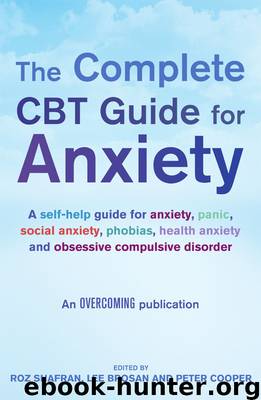The Complete CBT Guide for Anxiety by Lee Brosan

Author:Lee Brosan [Brosan, Lee]
Language: eng
Format: epub, mobi
ISBN: 9781780331324
Publisher: Constable & Robinson
Published: 0101-01-01T00:00:00+00:00
Learning to face our fears
In the ‘monsters’ metaphor on pp. 232–3, in order to overcome the fear, the bottom line is that the child needs to face the fear to learn that there is nothing under the bed. With hypothetical event worry this would mean facing the content of our worry while also dropping our efforts at avoidance: namely, suppression, distraction, pushing images away and mental gymnastics.
You may feel daunted by this, which is entirely understandable. You may say to yourself, ‘This will make my worry much worse!’ Remember that you probably experience these nightmarish daydreams at least every day and often for prolonged periods of time, and that trying to avoid them or not thinking about them has made no difference.
It is normal to feel upset when you start to face your fears because the ideas in our worry can be really terrible. It is precisely because you really care about the things you worry about that it is so upsetting. Being able to tolerate upsetting thoughts and images will not make you insensitive or uncaring. It will mean that you can, in fact, start to tell the difference between thoughts and reality. Imagine not being terrified by your worry, but being able to participate and enjoy the moment, living, not worrying.
In general, to help someone overcome their fear we would get them to confront it, or expose themselves to it. In order for this exposure to work they have to stay with the thing they are frightened of until their anxiety comes down naturally – which it will. You will probably be concerned that the anxiety will not reduce and that it will spiral out of control, but this just isn’t the case. Our anxiety does come down, even without us doing anything to make it come down. We have to learn to allow the wave of fear to wash over us, letting go of all our attempts to avoid or control it, in order to find out that nothing bad will happen.
To work with your hypothetical event worry, it is important to sit with the feelings without doing anything to make the situation or your feelings better. Learn that hypothetical event worry is a stream of thoughts. These thoughts do not describe real events. They are not facts. They are not premonitions. They are just thoughts. They are the by-products of your imagination, revolving around things that are important to you.
Download
The Complete CBT Guide for Anxiety by Lee Brosan.mobi
This site does not store any files on its server. We only index and link to content provided by other sites. Please contact the content providers to delete copyright contents if any and email us, we'll remove relevant links or contents immediately.
The Art of Thinking Clearly by Rolf Dobelli(8889)
The 5 Love Languages: The Secret to Love That Lasts by Gary Chapman(8562)
Mindhunter: Inside the FBI's Elite Serial Crime Unit by John E. Douglas & Mark Olshaker(7871)
Becoming Supernatural by Dr. Joe Dispenza(7136)
The Road Less Traveled by M. Scott Peck(6667)
Nudge - Improving Decisions about Health, Wealth, and Happiness by Thaler Sunstein(6657)
Enlightenment Now: The Case for Reason, Science, Humanism, and Progress by Steven Pinker(6430)
Win Bigly by Scott Adams(6338)
Mastermind: How to Think Like Sherlock Holmes by Maria Konnikova(6271)
The Way of Zen by Alan W. Watts(5824)
Factfulness: Ten Reasons We're Wrong About the World – and Why Things Are Better Than You Think by Hans Rosling(4041)
The State of Affairs by Esther Perel(3960)
Gerald's Game by Stephen King(3943)
Man's Search for Meaning by Viktor Frankl(3667)
The Confidence Code by Katty Kay(3593)
Thinking in Bets by Annie Duke(3554)
The Worm at the Core by Sheldon Solomon(2944)
Enlightenment Now by Steven Pinker(2931)
Liar's Poker by Michael Lewis(2830)
